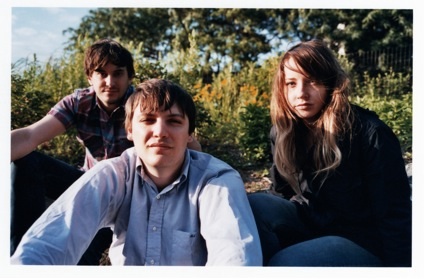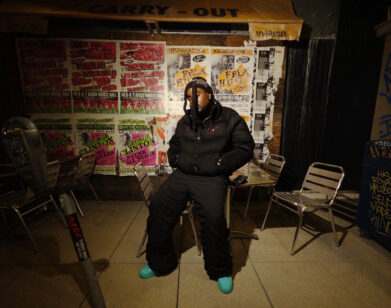What’s in a Name?

The only diary entry on Brooklyn noise-pop outfit Grooms’ Myspace page is a playful one, titled “New Name…New Album…New Haircuts.” (The haircuts part, it turns out, is a joke–bassist Emily Ambruso confides she hasn’t cut her hair in over a year.) The entry starts out: “We were Muggabears, now we’re Grooms. Is it a verb? Is it a noun? Not telling.”
Grooms (née Muggabears) are, thankfully, more forthright in person than in writing. In anticipation of their Under the Tracks show at Highline Park tomorrow, we sat down for a chat at Death by Audio, the Williamsburg arts space where the band practices and records (Emily lives there, too, with a cat named Honeybeans).
ALEXANDRIA SYMONDS: What have you been doing today?
EMILY AMBRUSO: I had a mole removed!
AS: Yeah? From where? Is it sensitive?
EA: [Gestures to her ribs] It’s numb. I don’t even feel it.
JIM SYKES: I was working. My day job is as a Ph.D. student, so I was writing.
AS: What’s your topic?
JS: Music–actually, ethnomusicology.
AS: So I have to ask–what’s with the name change?
TRAVIS JOHNSON: [Muggabears] was originally kind of a joke that was supposed to, I guess, be ironic–because it didn’t fit the music. I guess we got tired of that. And then, you know, we have a new album and a new drummer.
AS: Do you think that animal names are on the way out and wedding-themed names are on the way in?
JS: What would the wedding theme be?
TJ: Oh, Grooms, she’s thinking.
EA, JS, TJ: Oh! [All laugh]
JS: It’s a funny thing: I used to think of it that way, when they first told me. But then I saw… on the T-shirt are two monkeys grooming each other. So I actually like to think of it that way, more than “bridegroom.”
TJ: Animal names are probably going to be here to stay for a while. It was weird, because that name-we’d had that for years, or I had been using it for years, and then there were all these bear names. So it was really kind of weird to be lumped in with them. I was like, “Grizzly Bear? I just came up with this name in 2000!” But anyway, it’d be cool if there were some other wedding names.
JS: There is another band called The Grooms, am I right about that?
TJ: Yeah. It’s like a husband-and-wife duo. We didn’t know about it. We thought we did all the research we could do. It’d be really funny to change your name and then a week later, have to change it again, because, oh, there’s already a “The Beatles.”
AS: Is this a new musical direction for you, or were you just sick of the name?
TJ: We’d already recorded the album, which I think is new in some ways–for us, anyways. I think the stuff we’d been working on with Jim was different, also. But it’s not entirely out of nowhere. It’s not like we were a noise-pop band and now we’re ska, or anything.
AS: The album is called Rejoicer, but the track names are pretty depressing.
TJ: The track names? Yeah.
AS: Where’s the disconnect there?
TJ: Well, there’s a song that says “Rejoice,” and we were thinking that could maybe be a title, but I thought that was a little bit too plain. And I liked the idea of putting the R on the end. It just changes the feel a lot, and conjures up things like Revolver and Repeater and other really classic albums. I think almost all the songs have at least some-there’s always a bit of hope in every single song.
EA: Songs like “Acid King of Hell,” that sounds really dark and sad, but–
AS: That’s actually one of the more upbeat ones, right?
EA: Yeah, right! That’s Travis’s little brother’s video-game avatar name.
TJ: Yeah, the song’s about him.
AS: How long have you lived here?
EA: Two years.
AS: What’s it like to live where you work?
EA: Weird. I like it sometimes, because I’m never late to practice, because I’m here. But it’s also weird, when I’m trying to do stuff and they’re like, “Come on, let’s practice!” and I’m like, “I want to eat breakfast.”
AS: Where do you two live?
TJ: I live in Greenpoint.
JS: Strangely enough, I live on the Upper West Side at the moment.
AS: Where are you getting your degree?
JS: University of Chicago. But I grew up outside of New York and lived here for a couple yearsafter college, and I got tired of Chicago, so I moved back here to write my dissertation.
AS: What’s it on?
JS: I studied music in Sri Lanka. I’ve done three trips there and lived there for a year. It’s mostly on this ritual drumming genre, but it’s also about music and ethnic conflict and war.
EA: How did you like that book Roxy got you?
JS: Oh, that’s awesome. She gave me this book–
EA: When Women Were the Drummers. We went to a metaphysical bookshop in Long Island, and I got tarot cards. I thought it would sell really cool stuff and we could invoke spirits and everything. But then it turned out to be one of those New Agey places.
JS: This is a great book, though. I think I might actually assign it if I teach a class again. It’s basically arguing that women drummers have gotten written out of history, and that if you look at the ancient Greek culture, which is supposedly the foundation of Western civilization, that the worship of the mother goddess, like Aphrodite, for instance, was really important. And there was this category of people who were women frame drummers–sort of a tambourine-looking instrumentthat played a really important role in these ritual practices. But because of the development in Christianity and the denigration of drums with the Church, and of course that whole patriarchal subordination of women, plus the idea that drums were lewd, basically that was kind of taken away from women. It was completely written out of history. So when the book looks back at ancient Greek culture and looks at the role of the woman drummer. Really interesting. There’s always been women musicians, but from what I know, it was the Church that looked down on drumming.
TJ: I wonder what it was about drumming that they would look down on.
JS: Well, I think this is still an attitude today…
TJ: It’s somewhat sexual?
JS: People think that drums make people come unhinged. It’s the same sort of criticism against rock and roll, that it was too sexy and too lewd–it just wasn’t civilized.
TJ: Suggestive.
JS: And that’s the reason why people from a lot of other cultures around the world, when they’ve modernized and tried to pick their own national music tradition, that they’ve had a hard time looking at their own music. Because often it would involve loud drumming, and they didn’t feel like that was civilized enough to publicize for the world.
AS: What have you been listening to lately?
TJ: I found a copy of Red-Headed Stranger, by Willie Nelson, the other day. I’ve been listening to that.
AS: That’s a great album.
EA: He works at a record store.
AS: Oh, Travis does? I thought you meant Willie Nelson.
TJ: Yeah, he’s hit really hard times with the IRS.
Grooms’ first full-length album, Rejoicer, is out October 20 on Death by Audio. They play Under the Tracks at Highline Park in New York on September 5.






